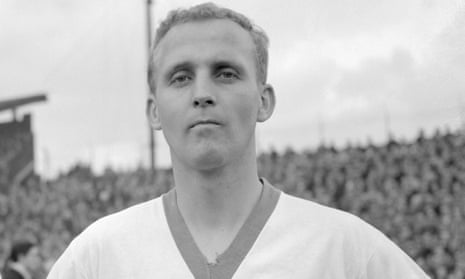Alex Young, one of the most revered players in Everton’s history, has died at the age of 80.
The Golden Vision, as the former Scotland international was known, died in hospital in his native Edinburgh on Monday after a short illness. He scored 89 goals in 275 appearances for Everton, winning the league in 1963 and the FA Cup three years later, but it was his style and skill for which he was idolised during eight years at Goodison Park and beyond.
Ken Loach, the Bafta-winning director of I, Daniel Blake, directed a docu-drama about Young and his relationship with Evertonians in 1968 called The Golden Vision. The striker’s last appearance at Goodison was in November for a preview of a second film about his career – Alex The Great – commissioned by his biographer and friend, Dr David France.
Though suffering from dementia and struggling to walk, Young travelled from Scotland with his wife, Nancy, and three children to attend the screening and take what turned out to be his last look around Goodison. “I’m a Scot by birth and an Evertonian by choice,” Young said in his biography.
The foreword to Dr France’s 2008 book was written by the late Alan Ball, who played alongside Young towards the end of the striker’s Everton career. “I place Alex Young on my short-list of the greatest footballers that I have been lucky to witness up close and personal,” said the England World Cup winner. “He oozed God-given ability. Unlike me, he could head the ball, shoot, pass and dribble with both feet and keep his mouth shut under the severest provocation. My dad was a big admirer of The Golden Vision and often likened him to the great Tom Finney.”
Young started his career with Heart of Midlothian, where he scored 103 goals in 194 appearances between 1955 and 1961. He won two Scottish League titles and a Scottish Cup with the Edinburgh club before joining Everton in a joint deal with George Thomson for £55,000. Young, who worked as a coal miner when starting out at Hearts and ran an upholstery business after retiring from the game, received a £2,000 signing fee from the Goodison club.
When Harry Catterick dropped Young to give a then 16-year-old Joe Royle his debut at Blackpool in 1967 the title-winning manager was assaulted “by two or three hooligans on my way to the club coach”, as he later described the confrontation with irate Everton fans.
Royle was present at Goodison when Young returned for the last time. He said: “Alex is part of the legend of this club. He was always good to me in the dressing room and there was never animosity if I was in the team sometimes – he was always encouraging me.
“He was a wonderful, old-fashioned talent. He swayed and floated around the pitch but few mention that he had a wonderful turn of foot over 10 yards and his acceleration was terrific. For not the biggest of men, he was tremendous in the air. He was just a wonderful, old school talent that you just don’t see now. It was artistry with Alex, a cleverness. He would stand on the ball, knowing, almost like a matador tempting someone to tackle him. Then, once he would be going one way, his body would be going in completely the opposite direction. People would find themselves looking rather silly. You had to get close to him and be quite threatening but that didn’t bother him either. You’d see this gentle man with blond locks but he could look after himself.”
Young played briefly for Glentoran and Stockport County before being forced to retire by knee problems.

Comments (…)
Sign in or create your Guardian account to join the discussion